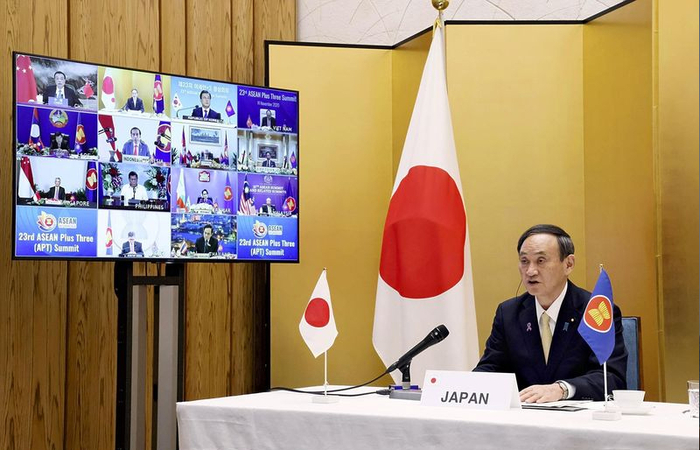
Amid the continued tense bilateral relationship between Japan and South Korea, the two countries have increased reciprocal visits by high-profile politicians and government officials in attempts to smooth the rough edges. Of particular interest is the unresolved issue of lawsuits involving South Korean former wartime requisitioned workers.
On Friday, Prime Minister Yoshihide Suga and South Korean lawmakers including Kim Jin-pyo, who leads the South Korea-Japan Parliamentarians Union, met at the Prime Minister’s Office in Tokyo. However, no clue for a thaw was found.
“The relationship between Japan and South Korea has been in a very difficult situation,” Suga told Kim and other members of the South Korean delegation at the meeting on Friday.
According to a person present at the meeting, Suga asked them to relay the message to South Korean President Moon Jae-in that Seoul should first create an opportunity to resolve the issue.
Since Suga took office, the two countries have accelerated moves to mend the stalled bilateral relationship.
Takeo Kawamura, secretary-general of a nonpartisan parliamentary league that promotes the Japan-South Korea relationship, Shigeki Takizaki, director-general of the Foreign Ministry’s Asian and Oceanian Affairs Bureau, and other high-profile people recently visited South Korea in succession. From South Korea, officials such as National Intelligence Service Director Park Jie-won have visited Japan. And on Thursday, Vice Foreign Minister Takeo Akiba held phone talks with South Korea’s first vice foreign minister.
Two years have passed since the South Korean Supreme Court ordered Japanese companies to pay compensation to the former requisitioned workers. Procedures are being taken to convert the companies’ seized assets into cash. Japan and South Korea are both aware that the time left to prevent this action is limited.
However, efforts by the both countries have produced no major positive results.
At a press conference on Friday, Lee Nak-yon, leader of the South Korean ruling Democratic Party, said, “I don’t think they [the delegation members] brought a solution proposal” for the wartime labor issue.
A senior official of the Japanese Foreign Ministry also said: “The South Korean side didn’t present [any solution proposals at the meeting with Suga]. We’ve got nothing.”
As Moon has taken a victim-oriented approach, he has not changed his position that the Japanese companies should pay redress to the victims in one way or another. According to South Korean government sources, the Moon administration intends to hold a Japan-South Korea summit on the sidelines of a Japan-China-South Korea leaders summit being arranged in South Korea by the end of this year. Moon intends to take advantage of the bilateral summit to issue a joint declaration that will collectively resolve pending issues, including the wartime labor and Japan’s tightening of export controls, the sources said.
On the other hand, Tokyo has ruled out the court rulings that ordered the Japanese firms to pay compensation, saying that the wartime labor issue was settled under the 1965 Agreement on the Settlement of Problems concerning Property and Claims and on Economic Cooperation between Japan and South Korea.
Frustration apparently has grown on the Japanese side as the South Korean side, including the lawmakers who visited Japan, did not present realistic proposals to resolve the issue.
“There wasn’t anything that sat well with us,” a senior Japanese government official said.
The Japanese side has taken a stance not to agree to hold even the trilateral summit if the situation remains unchanged. During the meeting Friday, Suga expressed caution after Kim asked him to visit South Korea.
If South Korea acts to cash in the seized assets, the Japanese government is expected to take strong countermeasures.
If that happens, a senior official of the Japanese Foreign Ministry said, “Further deterioration in the bilateral relationship will be unstoppable.”


